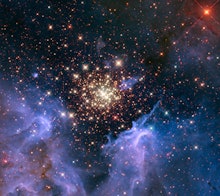Cosmic rays could support alien life — here’s what that means

Many scientists think an Earth-like planet is our best bet for finding alien life, but new research may have just turned that assumption on its head. A paper published Oct. 5 in the Journal of the Royal Society Interface suggests that planets with little to no atmosphere or sunlight might also be able to support life thanks to cosmic rays.
Cosmic rays are beams of high-speed particles flying through space at nearly the speed of light, according to NASA. For planets that are wandering through space without a star to orbit, cosmic rays could provide enough high-energy radiation to power underground colonies that don't receive much sunlight or atmospheric protection.
The idea is modeled after a bacteria called Desulforudis audaxviator that lives underground on Earth, according to Popular Science. Radioactive elements like uranium break up water molecules into food for the bacteria. Cosmic rays could do the same thing for underground microbes on other planets, according to the new research.
"For this mechanism to work, the planetary object should have a thin or no atmosphere at all so that more energy from cosmic rays is available in subsurface environments," study author Dimitra Atri, an astrobiologist at the Blue Marble Space Institute of Science, said in an email. "Atmosphere acts as a shield and reduces the energy reaching below the surface. For example, the Martian subsurface receives about 1,000 times more energy from cosmic rays than the Earth."
Does this mean we should widen our search for alien life?
The short answer is yes, according to Atri.
"Yes, since this is an additional energy source that life could use (which has been overlooked before), it is possible that life might exist on planets that are very different from us," Atri said.
Only a handful of known planets outside our solar system are similar to Earth. This new research suggests we shouldn't necessarily limit our search to those worlds.
Scientists are already working on ways to send space probes beyond our solar system to investigate other planets.